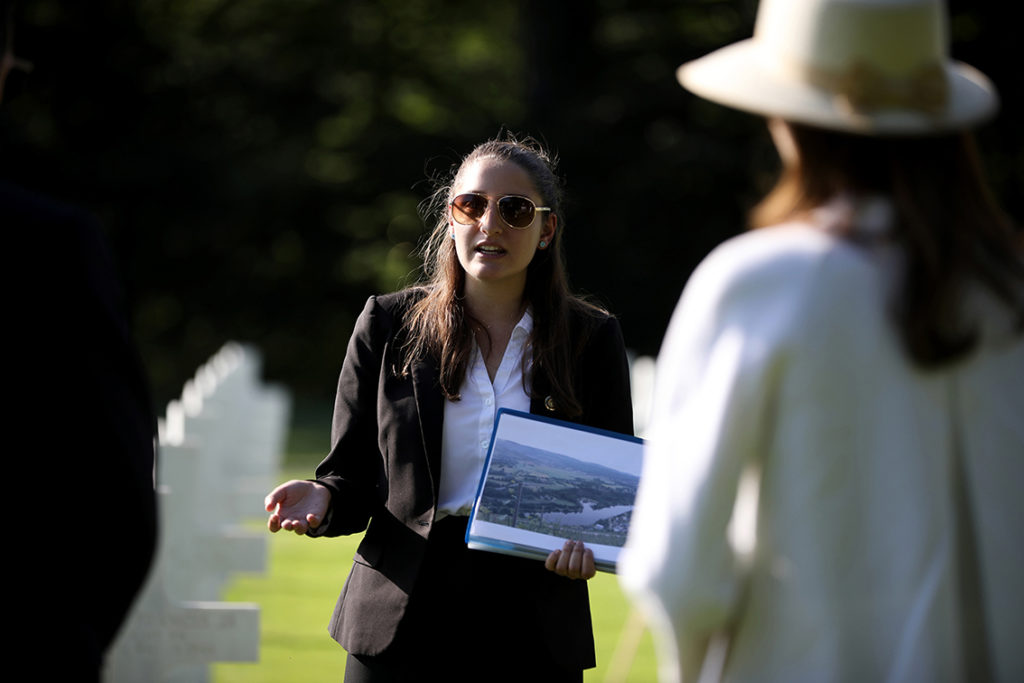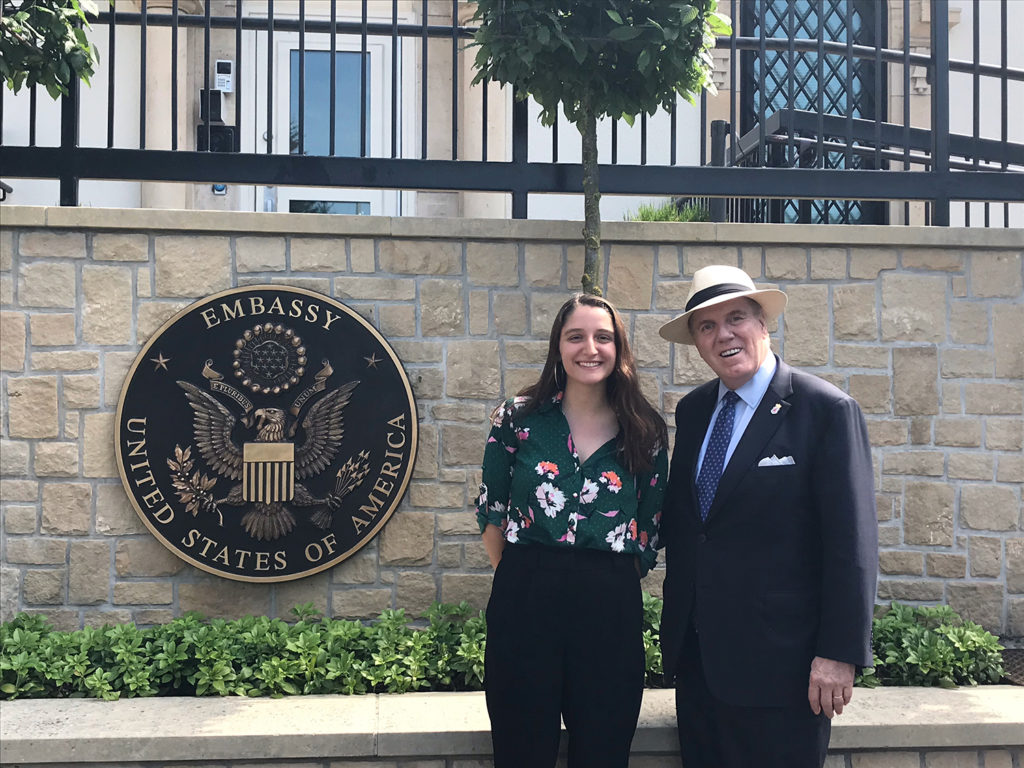Luxembourg internship gives Juliet Michaelsen ’19 a firsthand look at a career in diplomacy

On July 4, while most of her fellow Class of 2019 graduates were enjoying barbecues and fireworks, Juliet Michaelsen was on the job. An intern at the American Battle Monuments Commission (ABMC) at the Luxembourg American Cemetery in Hamm, Luxembourg, Michaelsen assisted a U.S. Congressional delegation during its Independence Day visit to the cemetery. The Luxembourg American Cemetery is the final resting place of Gen. George S. Patton and more than 5,000 American soldiers, many of whom died in the Battle of the Bulge and the advance on the Rhine River (1944-45). Michaelsen’s internship is the first at the cemetery funded by a Leir Luxembourg Summer Research Scholarship, one of several student internships supported by Clark’s Henry J. and Erna D. Leir Luxembourg Program.
A political science major concentrating in international relations, with a minor in history, Michaelsen has had two other internships at Clark. Previously, she interned at the Central European Journal of International and Security Studies at the Metropolitan University Prague and at RESOLVE, an environmental conflict resolution nongovernmental organization.
Her senior honors thesis, an analysis of current nuclear weapons strategies, gave Michaelsen the opportunity to investigate whether two Cold War-era nuclear doctrines are still relevant today and, if so, what factors affect their use.
Before graduating in May, Michaelsen was elected to Pi Sigma Alpha, the national political science honor society, and received Clark’s Sallie Robison Holthausen Prize for Excellence in International Relations.
Below, she reflects on her Clark experience, her internship in Luxembourg, and what lies ahead.

Describe your internship with the American Battle Monuments Commission.
I worked on a variety of projects, some related to diplomacy, some to U.S. politics, and others to history. On a day-to-day basis, it was a combination of working on my own projects and helping with tasks that needed to be done in the cemetery. My projects included redesigning the self-guided tour, redesigning the children’s tour booklet, posting semi-weekly stories on the agency’s website, and creating presentations for VIP visits (this includes researching the history of a soldier and presenting it). I also helped with next-of-kin visits — when a family member of a service member who is buried in the cemetery comes, we sand and flag the headstone and then do research on that soldier for the family.
My favorite project so far was the work I did for the congressional delegation that came to Luxembourg in early July. The delegation — about 55 people, including 17 members of Congress, many of their spouses and some staffers — planned to visit the cemetery on the Fourth of July. I produced biographical sketches of the delegation members that I shared with the cemetery staff, attended the planning meetings at the U.S. Embassy with my boss, and researched and presented the stories of two soldiers for Rep. Tom Graves (Georgia), Rep. Val Demings (Florida), and J. Randolph Evans, U.S. Ambassador to Luxembourg.
Who at Clark has inspired you?
Throughout my four years at Clark, Professor Michael Butler has gone above and beyond his role as my academic adviser. He encouraged me to take classes that further my academic knowledge and to conduct research on topics that are challenging but interesting to me. He also provided me with numerous opportunities to enrich my education, including the chance to be a peer learning assistant for one of his classes and to apply for this internship at the ABMC. In Professor Butler’s role as my thesis advisor, he read drafts upon drafts of my work and helped me edit or come up with new ideas. Most of all, he encouraged me to rise to my full potential.
Can you describe a memorable learning moment at Clark?
I studied abroad in Prague, Czech Republic. No other Clark students were enrolled in the program that semester and the national language of the country is Czech, meaning I had to both meet new people and learn a new language, all while getting used to living in a new place far away from home. I had never traveled to a different country or traveled alone; throwing myself into this environment taught me to be self-sufficient and independent in ways I did not know were possible. I learned how to travel in foreign countries by myself and how to communicate with people when there is both a language and cultural gap. Studying abroad gave me the confidence in my own abilities to leave the nest — both at home and Clark — and succeed elsewhere.
How has Clark helped you develop your passions and interests?
When I was an incoming first-year student, I already knew I wanted to major in political science. It has been my consistent passion since I was 7 years old and talked politics in the car with my friends’ parents, regardless of whether I knew what I was actually talking about. However, I was dead-set on concentrating on American government and going to law school. Through taking a diverse set of classes in the Political Science Department, joining the Mock Trial team, and speaking to multiple professors, I discovered my interests are further away from law and more toward international relations and how the United States fits into the international community.
How has your time at Clark has helped prepare you for your future?
Many great political science professors helped me narrow or combine my interests into a potential career path and encouraged me to expand my knowledge on different subjects so I’m a better job candidate. The Leir Luxembourg Program, by funding my internship at the ABMC, has given me the opportunity to explore career options in the U.S. government, get on-the-job experience, and learn how to translate my academic knowledge into practical knowledge.
What are your plans post-Clark?
Now that my internship has come to an end, I am looking for jobs in the field of diplomacy, policy, or general international relations. I plan to take a break from school and also get some real experience before I go to grad school.


